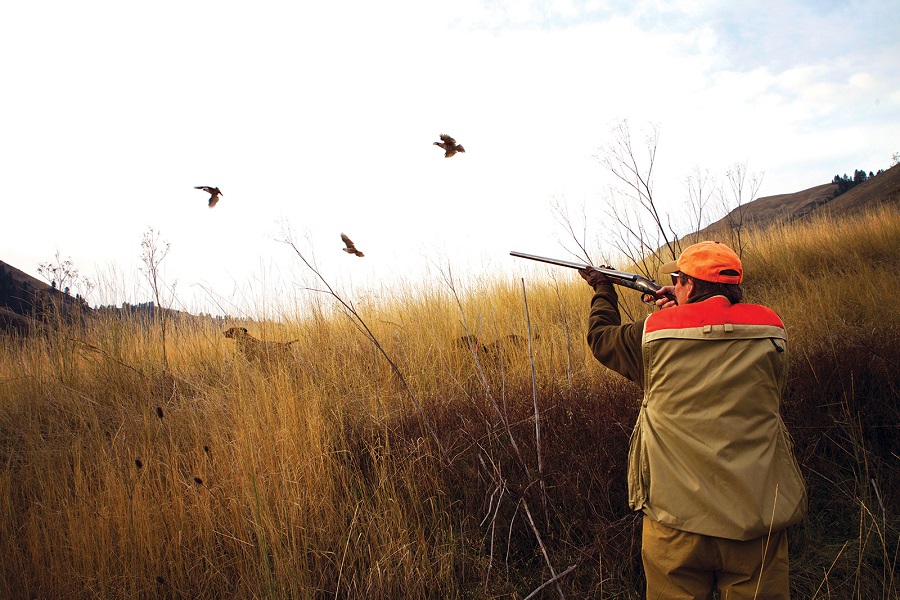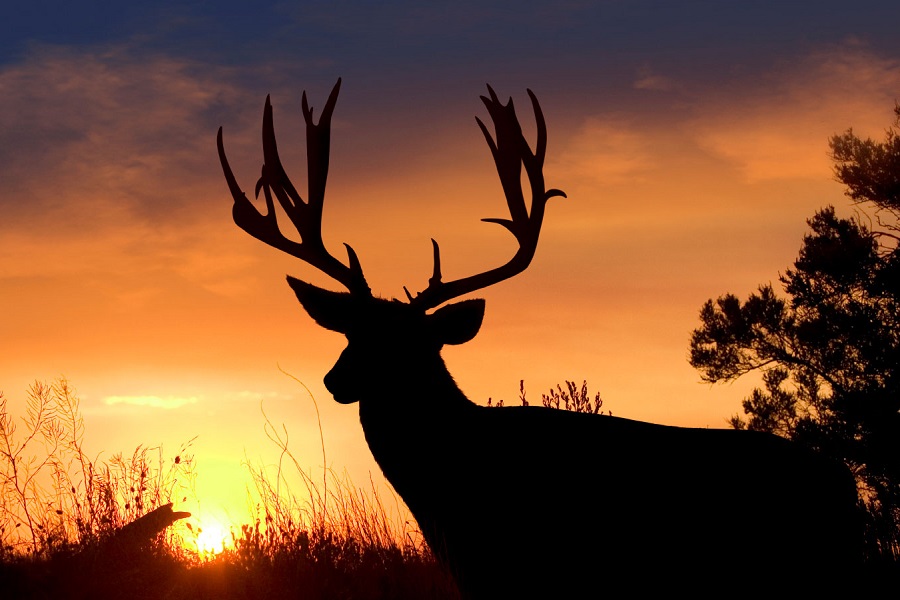Fido, Lassy, or whatever cliche name your pooch has, they’re coming along with you on the hunting trip. There’s no better way for man and dog to bond than by partaking in an instinctive hunt for food, but not all dogs are born with the same natural hunting prowess.
In fact, there are so many different breeds of dogs nowadays that it’s hard to tell.
The best hunting dogs are on this list. If you’re looking at getting a dog, going with one of these ten breeds could be your ticket to more effective and engaging hunting right alongside a four-legged friend.
1. Labrador Retriever

You can’t even deny it—you knew this was coming. Labs have retriever in their name for a reason: they’ll grab fresh duck and turkey and haul it on their back to leave it at your feet.
They’re loyal beyond compare, which is why hunters love them so much. No matter what happens, they’ll have your scent and find their way back to you.
They also make excellent family dogs, so when you’re not hunting (which will be more often than you are hunting), you’ll have a trustworthy companion for your family.
2. American Foxhound

They’re bred to do exactly what you would think: hunt foxes. Well, that and deer. They derive from English foxhounds and were basically hunters best friends for years before other breeds were created or other dogs became more popular for hunting.
An American foxhound has the ability to stay alert for hours on end, and it takes a lot longer for fatigue to hit them.
Dog hunting has legal restrictions in some areas, and an American foxhound is rarely seen as anything other than a hunting dog, so even if you bring your dog “camping” with you near a hunting area, you could face suspicion.
3. Bluetick Coonhound

Designed to pick up on scents and run with them, blueticks are basically high-energy dogs. You can just look at their faces and tell that they’re always itching to play and get their energy out.
They’re loud; they can be heard through the underbrush, and they make decent family dogs when they’re not on the hunting trail.
You just have to understand that they’re going to need additional walks and more playtime, and they are fairly easy to excite and get riled up, so do be careful with their temperament through the training process.
4. Chesapeake Bay Retriever

Often called Chessie, these powerful pups are in the same boat as Labrador retrievers.
They don’t mind the cold and will jump straight into the water so as not to lose the scent of whatever it is you’re hunting. Labs are more family-friendly, whereas a Chessie is best suited for a single master in a household with no children or other pets.
They are loyal, fierce, and very territorial. They don’t make for aggressive dogs, but they’re loud when they feel like their territory is being threatened, making them slightly competitive with children.
5. Golden Retriever

The ultimate gun dog, golden retrievers are loyal and very enthusiastic and make fantastic family pets. They’re not ones to bark right away and instead will stand their ground instead of being combative.
As you’d want in any dog, they’re loyal and can pick up on your scent, so even if they dash after wounded prey during a hunt, they will find a way to get back to you.
Golden retrievers are very affectionate dogs, so they’ll come into the tent with you on an extended trip, and they’ll always be trying to sleep at the foot of the bed (or with you) even after training. Give them some extra love.
6. Pointer

Essentially, they’re the dogs that we’ve seen in cartoons that point with their nose and tail, making a sort of stretched-out arrow.
They come in many different subbreeds and hunt small game like it’s nobody’s business. They can pick up on the scents of birds like pheasants and quail and will endlessly hunt them down.
The only bad thing about pointers is that they’ll dedicate themselves to the hunt with absolute involvement and enthusiasm, so they may not listen to your commands if you’re trying to call it quits early or head back to the campsite before the sun goes down. Keep them close.
7. Irish Setter

Big and floofy, these pups are excellent hunters, but they’re also seen in dog show beauty pageants.
There’s not much of a distinction between them and English setters, so either one will do well. They get along with the family, but they’re a bit stubborn when it comes to training, so you will surely have your work cut out for you.
They get pretty big, so be ready to support a healthy and large diet to keep their strength up. They’ll be putting those muscles to good use when it comes time to retrieve a downed small game.
8. Beagle

They may not look it, but they’re very stubborn pups that will take a long time to break in. They want to prove themselves as the alpha, so training is required before you decide to bring them out on the hunt.
They’re small, but they have excellent agility and a nose that other breeds can’t match. Their energy levels make them great hunting companions, but they might locate downed game and not actually retrieve it.
Beagles make rough house pets when you have children, cats, or other dogs to take care of.
9. Bloodhound

You had to see this one coming. Bloodhounds are named for their ability to trace and track scents effortlessly.
They’re very easy-going, so having them around during the day at home doesn’t require more than your standard walks and a little bit of playtime. They’ll happily sit on the porch with you or just lay around inside, so keeping them in prime hunting physical shape can be a bit of a challenge.
Bloodhounds listen to their masters with no problem and simply need to be fed in order to retain loyalty.
10. English Springer Spaniel

They’re adorable little companions that are great at hunting down small game, specifically birds. They’ll dash through the woods as if they were great big wolves, and they bring that level of energy and authority with them out on the hunting trail.
Springers are good family dogs, so if you’re only able to get out to hunt four times a year, it will be ready to give you a hand and get along with your children wonderfully.
11. Brittany

A mix between setters and spaniels, a Brittany is a medium-sized dog that doesn’t have a preset, specific hunting task in mind.
They’re ready to do just about anything you need them to, and it doesn’t take much time to get them accustomed to hunting.
Requiring minimal to no grooming (because they do it themselves), a Brittany is a great family dog and picks up the pace when you need it to.
12. Jack Russell Terrier

Now here’s a dog you can be happy with in all departments. They’re small, sure, but they have the energy of a dog twice their size.
Jack Russel Terriers have a tendency to amp themselves up, especially when they know they’ll be fulfilling a purpose, so expect sudden jumps in energy levels when the mood changes.
You couldn’t ask for a better dog to be around your children, either, and they tend to get along with other pups in the house.
A Healthy Diet Is Important For A Hunting Dog.
Even if your dog is bred to be a champion, their diet and exercise regimen are going to dictate their viability on a hunting trip. Nowadays, dog chow falls into the subpar category, with a tonne of filler grains that make your pup feel full but don’t do much for their strength and bone health.
Having the right meal is imperative to maintaining their physical prowess when they’re not next to you on the hunting trail. If they get a treat and enjoy the game you two hunt down together, that’s great, but their year-round, at-home diet needs to be optimised in order to maintain all that training and exercise.
As your dog piles on the years, you might have to get a new hunting hound to bring with you (every five to seven years, perhaps), which is okay; you’re just adding to the family.
A Man’s Best Friend
If you’re still on the fence about which dog to pick, do some deeper research and look up everything about these different breeds.
It’s important to have the best hunting companion with you for the ride; there’s no deeper way to bond with a dog than this.
Which type of dog you bond with—well, that’s in your hands now.
Resources:



